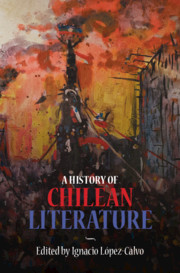Book contents
- A History of Chilean Literature
- A History of Chilean Literature
- Copyright page
- Dedication
- Contents
- Figures
- Contributors
- Acknowledgments
- Introduction
- Part I Proto-Chilean, Colonial Chronicles and Letters
- Part II Nineteenth-Century Articulations of an Embryonic National Consciousness
- Part III Beyond Chileanness: Heterogeneity and Transculturation in Canonical and Peripheral Twentieth- and Twenty-First-Century Literature
- Chapter 12 Gabriela Mistral, Chilean Women Writers, and Intersectionality
- Chapter 13 The Verse as Being in the World
- Chapter 14 Mapuche Poetry
- Chapter 15 The Translation Origins of Literary Mapuche Aesthetics
- Chapter 16 Theatrical Trends and Social Changes in Chile, 1910–2018
- Chapter 17 Jewish Voices, Chilean Literature
- Chapter 18 Chilean Arabic Writing
- Chapter 19 Asian-Chilean Writing and Film, and Chilean Orientalism
- Chapter 20 Croatian-Chilean Literature
- Chapter 21 Chilean-American Writing since September 11, 1973
- Chapter 22 LGBTQ Writing and Cultural Consciousness in Chile
- Chapter 23 Permutations of Selfhood in the Work of José Donoso
- Chapter 24 Isabel Allende, the Post-Boom, and Chilean Exile Literature
- Chapter 25 Roberto Bolaño: His Fiction of History, History of His Fiction
- Chapter 26 Alejandro Zambra and Recent Chilean Narrative
- Chapter 27 Film and Literature in Chile
- Chapter 28 Violence and Memory
- Chpater 29 Chilean Digital Literature
- Chapter 30 Detectives at the End of the World
- Index
- References
Chapter 21 - Chilean-American Writing since September 11, 1973
from Part III - Beyond Chileanness: Heterogeneity and Transculturation in Canonical and Peripheral Twentieth- and Twenty-First-Century Literature
Published online by Cambridge University Press: 27 September 2021
- A History of Chilean Literature
- A History of Chilean Literature
- Copyright page
- Dedication
- Contents
- Figures
- Contributors
- Acknowledgments
- Introduction
- Part I Proto-Chilean, Colonial Chronicles and Letters
- Part II Nineteenth-Century Articulations of an Embryonic National Consciousness
- Part III Beyond Chileanness: Heterogeneity and Transculturation in Canonical and Peripheral Twentieth- and Twenty-First-Century Literature
- Chapter 12 Gabriela Mistral, Chilean Women Writers, and Intersectionality
- Chapter 13 The Verse as Being in the World
- Chapter 14 Mapuche Poetry
- Chapter 15 The Translation Origins of Literary Mapuche Aesthetics
- Chapter 16 Theatrical Trends and Social Changes in Chile, 1910–2018
- Chapter 17 Jewish Voices, Chilean Literature
- Chapter 18 Chilean Arabic Writing
- Chapter 19 Asian-Chilean Writing and Film, and Chilean Orientalism
- Chapter 20 Croatian-Chilean Literature
- Chapter 21 Chilean-American Writing since September 11, 1973
- Chapter 22 LGBTQ Writing and Cultural Consciousness in Chile
- Chapter 23 Permutations of Selfhood in the Work of José Donoso
- Chapter 24 Isabel Allende, the Post-Boom, and Chilean Exile Literature
- Chapter 25 Roberto Bolaño: His Fiction of History, History of His Fiction
- Chapter 26 Alejandro Zambra and Recent Chilean Narrative
- Chapter 27 Film and Literature in Chile
- Chapter 28 Violence and Memory
- Chpater 29 Chilean Digital Literature
- Chapter 30 Detectives at the End of the World
- Index
- References
Summary
The onset of the coup d’état that transpired in Chile on September 11, 1973, followed by the establishment of a military dictatorship led by General Augusto Pinochet, are understood as the catalysts that initiated the largest migration of Chileans in the country’s recorded history. Overall, more than 400,000 citizens went into exile across the globe (Doña-Reveco 244).
- Type
- Chapter
- Information
- A History of Chilean Literature , pp. 442 - 461Publisher: Cambridge University PressPrint publication year: 2021



